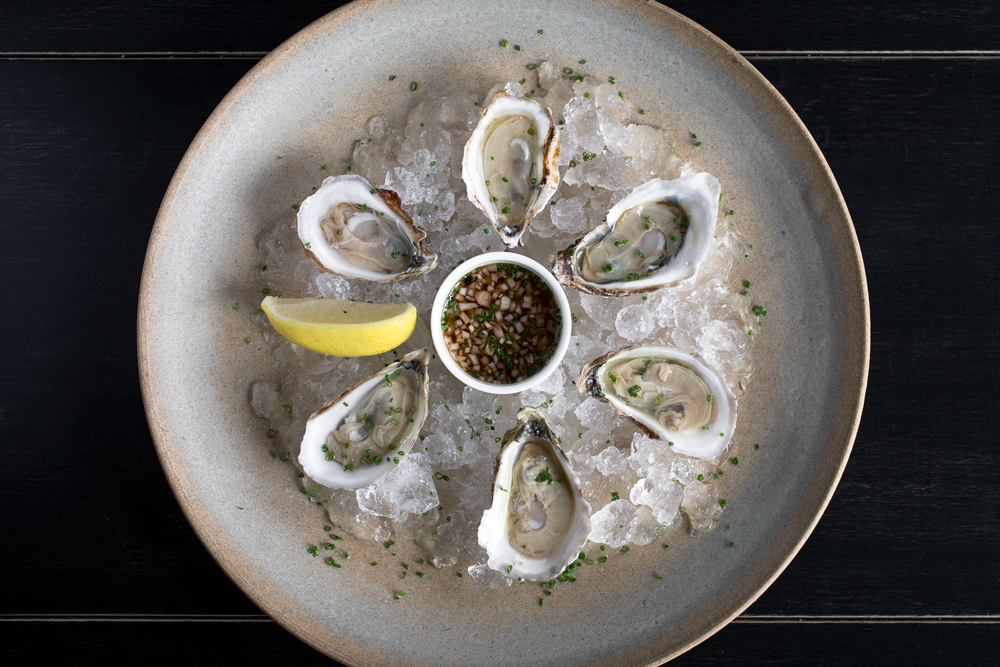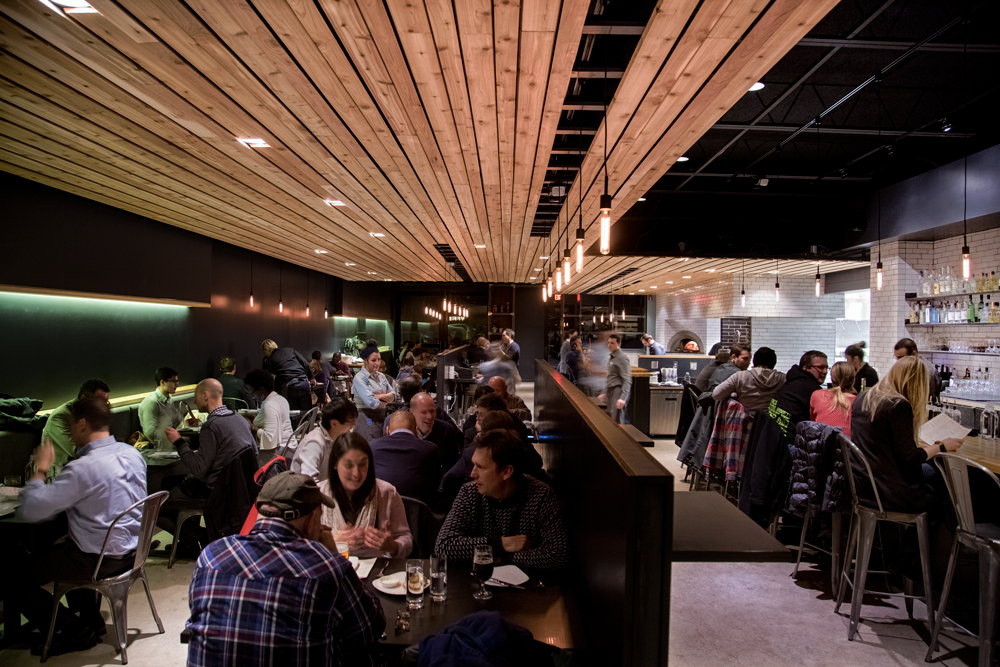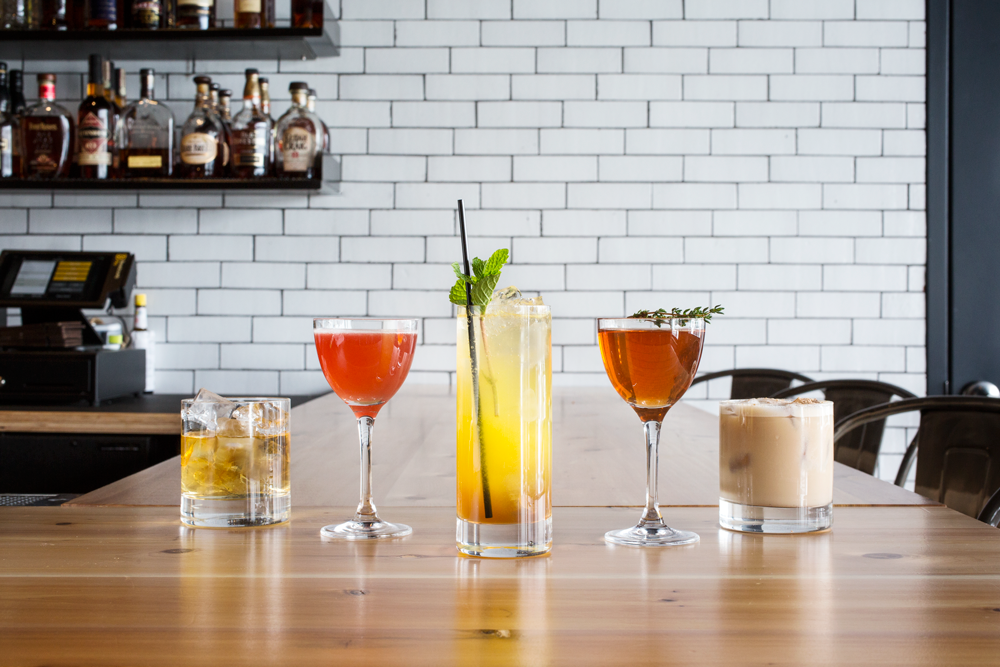Q&A
3.5.15 | Issue #12
WE'VE GOT A WEIRD RELATIONSHIP WITH DETROIT.
Which is probably why whenever something great about it leaks out into the wider food world—say a rash of spectacular restaurants—we all either clap wildly like the city just ate it's first solid food or, if you're on a coast, file it away into a subcategory for the Middle. We don't treat it the same as every other major hub, because it isn't. And that's a good thing.
There is something electric in the Michigan air, yes, but Detroit is not just rediscovering its greatness. According to business partners Andy Hollyday and Evan Hansen of Selden Standard (which just scooped up a James Beard nom for Hollyday's work in the kitchen) it's been there all along.
Evan Hansen (in photo, left): In the past six months, there have been six or seven new places that have opened, and there’s another half-dozen on the verge of opening. It’s hit this spot where now there’s this very exciting momentum. I think one of the coolest things about it is that it has a very small-town kind of vibe, where everybody knows one another and helps support you. There’s none of that competitive angle that you find in other cities, it’s just excitement over having real options and seeing your friends do well, and seeing the city itself develop this reputation as being a place in Southeast Michigan to find interesting things. We’re all invested in that concept more than anything else.
Are you having trouble finding talent to fill your expanding ranks?
Andy Hollyday: There are a lot of culinary schools in the area, but the talent leaves. There are a lot of very talented chefs around the country who are from Michigan, but a lot of people choose to go to larger markets, either on the coasts or in Chicago. We’re still dealing with that a bit, so our approach to hiring here is just to hire good quality people who might have a lack of experience, but who we can mold into what we’re looking for. So far, so good. We definitely had some intense interviews to get the quality of people that we do have.
EH: I think that’s the case for both back and front of the house. You do see people coming back, like a bartender who comes back from New York, or somebody who worked as a sommelier in San Francisco for a bit. That’s definitely starting to happen. But interestingly, this idea of hiring for a) being a good person and b) having some talent or drive rather than just experience or technical skills is just what you have to do. There’s a lot of that going on, and that’s been true for a couple of years now. The big cocktail bar in town, Sugar House, when they first staffed up, the owner and the bar manager were the only two guys on staff who had any serious craft cocktail experience and now they’ve built up this juggernaut across three restaurants that has what are considered to be the best bartenders in the region. Four years ago, there was no craft cocktail culture around here. Now, there are competitions every other week. There’s a whole subculture.
What is the defining characteristic of the new era of the city?
EH: Detroit is still Detroit, so there really isn’t great mass transit. It’s not Chicago, where you can just take the Blue Line up to Logan Square and wander around and hit seven amazing restaurants and cool cocktail bars. It’s more spread out. The exciting part about all of this being concentrated in the actual greater downtown area is that there’s starting to have that density. That’s one thing that’s a challenge.
AH: The reason I was attracted to the city when I first moved down here was the people. There are so many great people that live and work in the city. Things are changing now, but when I moved here eight years ago, it was a really gritty place. All the people that were here were here for a reason; they weren’t here because it was hip and trendy or an emerging culinary scene, they were just working to better the city. A lot of our friends who are opening up all these bars and restaurants, we’ve known for years. They’re all just working to bring some form of life to the city, whether it’s a restaurant or not.




How has this growth affected your purveyor network? Is the demand overwhelming the offerings?
EH: One of the interesting things about Detroit is that because there’s so much land—and again, I don’t want to overstate it, it’s not like there’s an urban farm on every corner—there are a fair amount of farmers. Once the spring hits, we’ll be buying a tremendous amount of our produce from people who are growing the food within the city. You could never get away with that in Manhattan, right? It’s maybe a small thing, but it’s true that there are a half-dozen Detroit-based farmers that we work with throughout the year. To have access to that, and to have personal relationships with people who live, work, think, grow stuff in the city and then come into your restaurant, is a growing aspect of the scene here.
AH: I have half a dozen farms within a two to three mile radius of the restaurant that we source from on a consistent basis during the season. Every year there’s an additional five to ten. There are thousands of gardens in the city. East Side, West Side, Midtown, Corktown...all over.
Does all this ever feel like a vindication of your vision for Detroit? Has your moment arrived?
AH: Having our own business is one of my dreams, so in that sense, it does.
EH: Before we opened this place, I had never worked in a bar or restaurant in my life. I was at home, collecting wine and brewing beer, making cocktails and cooking and lamenting with my friends about the lack of options. We even had a 150-person email list where people would trade info about places. Now, to see many of the people I met opening businesses, restaurants, bars, all in the span of a few years is really fun. I’m both a restaurant owner and my own audience, you know? It’s exactly what I’ve been wanting for a long time, the choices that we have.
AH: When we do get a new restaurant, or you see a farmer with a beautiful garden in this very blighted neighborhood, you appreciate it that much more because of all the hardships we’ve had. It’s good to be a part of the change.
EH: If you tap into one of those pockets or meet people in one of those communities...if you’re just driving through and not spending a lot of time in them, you’d assume there was nothing going on. I think feeling like you have a place and a community like that can be a very powerful motivating force. It’s fun to watch your friends open up places and be able to enjoy the fruits of their labor. That energy is infectious, and it all stems from people who were already here. I do think restaurants have a huge role to play there, as do bars and cafes, but a little market, or a bookstore, or a record shop are also woven into that same fabric. That’s what makes an area feel lively, that sense that there are other people with you.
AH: We’re also very conscious of everybody feeling welcome here. With service, especially, we want everybody—no matter who they are or how they’re dressed—to feel welcome. The fact of the matter is, we came into this neighborhood that has been very rough for years. The change that we brought to this building has been very welcome, but there’s also some who are still resistant to it, so we have to be careful with how we handle ourselves here. It’s more about being a part of the neighborhood, and not someone just trying to change things.
One thing you wish people would stop saying?
EH: I think it’s very easy to look at it on the surface. I used to have friends who lived in Chicago who would joke around like, “Don’t you miss having access to culture?” Well, fuck you! [laughs] What do you mean? I can’t even answer that I’m so angry at you, you know? So there seems to be that, then the other side which is the Detroit as blank slate that is finally developing. There have always been people here. There’s always been little pop-up restaurants. It’s always been there, it’s just now that the spotlight is big enough, people are starting to take notice. Obviously, it’s expanded dramatically over the past few years, but that’s what I would change. When people look at the city and assume there’s nothing going on.
AH: It’s not an apocalyptic war-zone. When I first moved here, everyone would always ask me what it was like...we have our fair share of challenges just like any other city, but there are so many awesome things here. It’s unlike any other city in the world. It’s not all in your face. You can’t just go downtown and stumble into a ton of places and have a great time. Here, there’s so many hidden gems. You have to know where to go, and work to find something great. It’s a very underground city in a lot of ways. I would just advise people to see it for themselves—mostly people are surprised by what they find. I wouldn’t want to live anywhere else.




